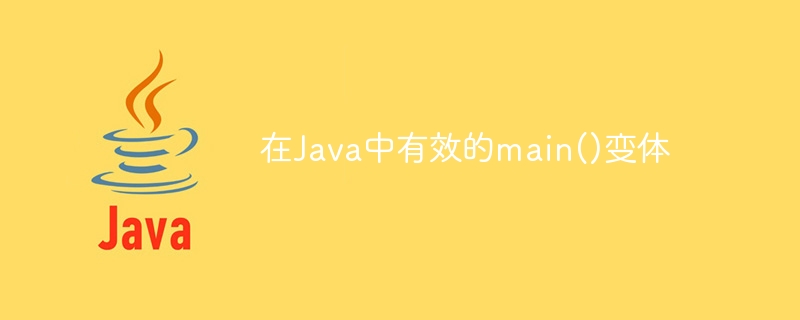

In Java, the main() method is the entry point for the JVM to start executing the program. If you've written Java programs, you're probably familiar with the traditional main() signature: public static void main(String[] args). But, did you know that there are several valid variations of the main() method in Java? This article delves into the versatility of main() in Java, showing its multiple valid formats and explaining their complexity.
Before delving into it
public static void main(String[] args)
In this format, public means that the method can be accessed from anywhere; static means that the method belongs to the class itself and does not belong to any instance of the class; void means that the method has no return value; String[] args are parameters , an array of String objects that stores Java command line parameters.
While the main() method signature above is standard, due to the flexibility of Java, it also supports several other valid variations. Let's check them out -
The keywords public and static can be interchanged without affecting the execution of the program -
static public void main(String[] args)
The main() method can be declared using final, synchronized and strictfp modifiers without any problems -
final public static void main(String[] args) synchronized public static void main(String[] args) strictfp public static void main(String[] args)
String array (String[]) syntax can be modified in the following ways:
public static void main(String args[]) public static void main(String... args)
The name of the parameter array (args) can be replaced by any valid identifier -
public static void main(String[] myArray)
It is important to note that while these variants provide flexibility, they may not conform to standard conventions. In professional programming environments, a canonical main() method signature is often required.
The main() method has some changes that Java does not accept, causing the program to fail to run. Here are some examples
Remove static from main() method
Change the return type from void to another type
Change the argument to main() to anything other than a string array
These changes will compile, but the JVM will not recognize the changed main() as the entry point of the program.
In Java programming, it is crucial to understand how the main() method works because it forms the starting point of the program. While the canonical public static void main(String[] args) is the most recognized and commonly used, Java's flexibility supports a variety of valid main() method variations.
However, keep in mind that adhering to a standard format is often best practice as it ensures consistency and readability across different programs and projects. As you continue your Java programming journey, understanding these nuances will enable you to write and understand Java code more effectively, demonstrating your mastery of this versatile language.
The above is the detailed content of Variants of main() that are valid in Java. For more information, please follow other related articles on the PHP Chinese website!




